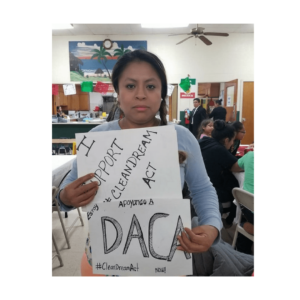Brenda Moreno

Brenda Moreno gets emotional every time she remembers that June afternoon in 2012 when she learned about Obama’s executive action that granted young immigrants a special status known as Deferred Action for Childhood Arrivals. The policy allowed young people who had been brought to this country by their parents a chance to pursue higher education, get work permits and even own property.
“I was posting cars on Craigslist and I opened my email and I saw someone had sent me a message that said ‘Obama approves DACA’ I was in disbelief and called Liz [Alex] and when she said ‘yes it’s true,’ I just started crying.”
During Women’s History Month, CASA is highlighting women leaders who are making a difference today in people’s lives. Moreno has been a vocal advocate of the Dream Act. She is the kind of leader that inspires others and the type of person that fuels the movement.
Coming to the U.S.
In 2001, Moreno and her family were forced to flee Mexico after her father, a local politician, started being targeted by his own party for not taking part in the embezzlement of funds for the town he represented.
Upon arriving in the United States, the family filed for asylum but were denied.
Moreno endured many challenges after her arrival in the city of Baltimore, Maryland. She did not know the language, was bullied by classmates and even teachers that would grow impatient with her. Her stress levels were so high that she developed chronic health problems and even started losing her hair.
Dreams Shattered Led to a New Sense of Purpose
In 2007, after many years in the U.S and now mastering the English language, Moreno was excited to be graduating high school, she had excellent grades and wanted to pursue her dreams of becoming a forensic doctor. But when she began her college application process that dream came to a halt.
“I did not qualify for in-state tuition my only option was to pay international fees but that was too expensive”
After realizing she wasn’t going to be able to go to college, Moreno became very upset and frustrated with her parents. That’s when one of her teachers introduced her to CASA.
“Kelly-O’Brien-Guerra who is now my boss told me about CASA and I suddenly realized I could become a voice for those that felt like me.”
Moreno became a volunteer youth organizer in Baltimore. She was one of the pioneer organizers of the Maryland driver’s license for undocumented campaign, the in-state tuition, and Dream Act movements.
Moreno continued volunteering with CASA even after she was able to get a job as a customer service representative for an insurance company. Moreno was optimistic after landing that job but once again her world would come tumbling down when the company was sold and the new owners required proof of citizenship.
“I needed to survive so I started working at the used-car dealership…I thought that would be it for me I was hopeful something could change but I did not know if it would.”
DACA changed Moreno’s life. It allowed her to go back to her customer service job, pursue higher education and later start working as a teacher assistant.
“All the work had paid off…and even though right now it doesn’t look good. I know that one day we will have a permanent solution. Just like the women’s movement…the end of slavery…the end of segregation…one day we’ll be reading about DACA and the Dreamers in History books because it will happen for us.”
Virginia Rincon
 Virginia Rincon’s heart breaks every time her shy, 17-year-old son comes home with stories of bullies who call him names and tell him to go back home to Mexico. He has switched schools three times fleeing violent attacks and an environment that has brought him to the edge of suicide.
Virginia Rincon’s heart breaks every time her shy, 17-year-old son comes home with stories of bullies who call him names and tell him to go back home to Mexico. He has switched schools three times fleeing violent attacks and an environment that has brought him to the edge of suicide.
The young man is a DACA recipient who has lived here since he was 4 years old. Yet to his classmates in the working-class and rural areas of Lancaster where he has attended middle and high school, he is an outsider.
Feeling her son’s pain and the treatment from her neighbors and those in her community has transformed the 35-year-old mother of four. She will not let herself drown in this pain.
“We may be immigrants but we still have rights like any human being,” said Rincon, a CASA Community leader who joined CASA in December 2017 and has become the strongest and loudest voice in the Lancaster area.
She played a crucial role in the development of a member committee in Lancaster and brings 10-15 new members to every meeting. She regularly canvasses the area promoting services such as legal and tax clinics as well as organizing and promoting actions all over the state.
She is a restless advocate for the Dream Act and TPS and is always eager to help her fellow community members, motivating them to come out of the shadows and speak their truth.
“All the hate that her family endures pushes her forward and keeps reminding us that if we have a voice we should use it,” said Leila Martin, CASA lead organizer for Lancaster who has seen Rincon blossom in her new role.
Rincon migrated to the United States with her oldest son from Mexico, in pursuit of a better life. Like many immigrants, she fled violence, poverty, and injustice.
In recent years, since the recent anti-immigrant attacks by President Donald Trump, the atmosphere in this small town has changed and it has put in jeopardy her American dream.
“Although the town has changed and it is scary if we don’t fight we won’t see a change,” said Rincon.
Like many other women warriors throughout history, their role is difficult to ascertain in the moment. Martin, herself an aid worker in Syria who was a witness to the upending of a country under siege, believes this too is an important moment in time and Rincon is an important piece to that history.
“All great movements are born out of extreme injustices and a lot of pain mixed in. The women of Lancaster like Virginia are creating history in this little corner of Pennsylvania fighting for justice and what is right,” said Martin.

